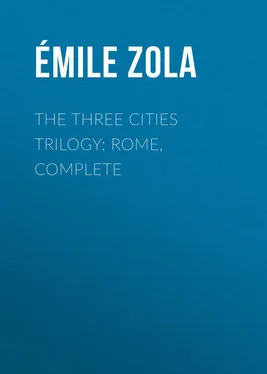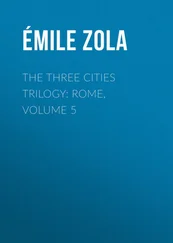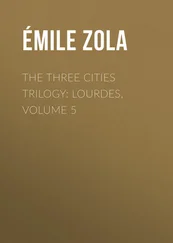Émile Zola - The Three Cities Trilogy - Rome, Complete
Здесь есть возможность читать онлайн «Émile Zola - The Three Cities Trilogy - Rome, Complete» — ознакомительный отрывок электронной книги совершенно бесплатно, а после прочтения отрывка купить полную версию. В некоторых случаях можно слушать аудио, скачать через торрент в формате fb2 и присутствует краткое содержание. Жанр: literature_19, foreign_antique, foreign_prose, на английском языке. Описание произведения, (предисловие) а так же отзывы посетителей доступны на портале библиотеки ЛибКат.
- Название:The Three Cities Trilogy: Rome, Complete
- Автор:
- Жанр:
- Год:неизвестен
- ISBN:нет данных
- Рейтинг книги:5 / 5. Голосов: 1
-
Избранное:Добавить в избранное
- Отзывы:
-
Ваша оценка:
- 100
- 1
- 2
- 3
- 4
- 5
The Three Cities Trilogy: Rome, Complete: краткое содержание, описание и аннотация
Предлагаем к чтению аннотацию, описание, краткое содержание или предисловие (зависит от того, что написал сам автор книги «The Three Cities Trilogy: Rome, Complete»). Если вы не нашли необходимую информацию о книге — напишите в комментариях, мы постараемся отыскать её.
The Three Cities Trilogy: Rome, Complete — читать онлайн ознакомительный отрывок
Ниже представлен текст книги, разбитый по страницам. Система сохранения места последней прочитанной страницы, позволяет с удобством читать онлайн бесплатно книгу «The Three Cities Trilogy: Rome, Complete», без необходимости каждый раз заново искать на чём Вы остановились. Поставьте закладку, и сможете в любой момент перейти на страницу, на которой закончили чтение.
Интервал:
Закладка:
“Yes, yes,” he exclaimed in a final outburst; “one gave everything, heart and brain, one’s whole life indeed, so long as it was a question of making the country one and independent. But, now that the country is ours, just try to stir up enthusiasm for the reorganisation of its finances! There’s no ideality in that! And this explains why, whilst the old ones are dying off, not a new man comes to the front among the young ones – ”
All at once he stopped, looking somewhat embarrassed, yet smiling at his feverishness. “Excuse me,” he said, “I’m off again, I’m incorrigible. But it’s understood, we’ll leave that subject alone, and you’ll come back here, and we’ll chat together when you’ve seen everything.”
From that moment he showed himself extremely pleasant, and it was apparent to Pierre that he regretted having said so much, by the seductive affability and growing affection which he now displayed. He begged the young priest to prolong his sojourn, to abstain from all hasty judgments on Rome, and to rest convinced that, at bottom, Italy still loved France. And he was also very desirous that France should love Italy, and displayed genuine anxiety at the thought that perhaps she loved her no more. As at the Boccanera mansion, on the previous evening, Pierre realised that an attempt was being made to persuade him to admiration and affection. Like a susceptible woman with secret misgivings respecting the attractive power of her beauty, Italy was all anxiety with regard to the opinion of her visitors, and strove to win and retain their love.
However, Orlando again became impassioned when he learnt that Pierre was staying at the Boccanera mansion, and he made a gesture of extreme annoyance on hearing, at that very moment, a knock at the outer door. “Come in!” he called; but at the same time he detained Pierre, saying, “No, no, don’t go yet; I wish to know – ”
But a lady came in – a woman of over forty, short and extremely plump, and still attractive with her small features and pretty smile swamped in fat. She was a blonde, with green, limpid eyes; and, fairly well dressed in a sober, nicely fitting mignonette gown, she looked at once pleasant, modest, and shrewd.
“Ah! it’s you, Stefana,” said the old man, letting her kiss him.
“Yes, uncle, I was passing by and came up to see how you were getting on.”
The visitor was the Signora Sacco, niece of Prada and a Neapolitan by birth, her mother having quitted Milan to marry a certain Pagani, a Neapolitan banker, who had afterwards failed. Subsequent to that disaster Stefana had married Sacco, then merely a petty post-office clerk. He, later on, wishing to revive his father-in-law’s business, had launched into all sorts of terrible, complicated, suspicious affairs, which by unforeseen luck had ended in his election as a deputy. Since he had arrived in Rome, to conquer the city in his turn, his wife had been compelled to assist his devouring ambition by dressing well and opening a salon ; and, although she was still a little awkward, she rendered him many real services, being very economical and prudent, a thorough good housewife, with all the sterling, substantial qualities of Northern Italy which she had inherited from her mother, and which showed conspicuously beside the turbulence and carelessness of her husband, in whom flared Southern Italy with its perpetual, rageful appetite.
Despite his contempt for Sacco, old Orlando had retained some affection for his niece, in whose veins flowed blood similar to his own. He thanked her for her kind inquiries, and then at once spoke of an announcement which he had read in the morning papers, for he suspected that the deputy had sent his wife to ascertain his opinion.
“Well, and that ministry?” he asked.
The Signora had seated herself and made no haste to reply, but glanced at the newspapers strewn over the table. “Oh! nothing is settled yet,” she at last responded; “the newspapers spoke out too soon. The Prime Minister sent for Sacco, and they had a talk together. But Sacco hesitates a good deal; he fears that he has no aptitude for the Department of Agriculture. Ah! if it were only the Finances – However, in any case, he would not have come to a decision without consulting you. What do you think of it, uncle?”
He interrupted her with a violent wave of the hand: “No, no, I won’t mix myself up in such matters!”
To him the rapid success of that adventurer Sacco, that schemer and gambler who had always fished in troubled waters, was an abomination, the beginning of the end. His son Luigi certainly distressed him; but it was even worse to think that – whilst Luigi, with his great intelligence and many remaining fine qualities, was nothing at all – Sacco, on the other hand, Sacco, blunderhead and ever-famished battener that he was, had not merely slipped into parliament, but was now, it seemed, on the point of securing office! A little, swarthy, dry man he was, with big, round eyes, projecting cheekbones, and prominent chin. Ever dancing and chattering, he was gifted with a showy eloquence, all the force of which lay in his voice – a voice which at will became admirably powerful or gentle! And withal an insinuating man, profiting by every opportunity, wheedling and commanding by turn.
“You hear, Stefana,” said Orlando; “tell your husband that the only advice I have to give him is to return to his clerkship at the post-office, where perhaps he may be of use.”
What particularly filled the old soldier with indignation and despair was that such a man, a Sacco, should have fallen like a bandit on Rome – on that Rome whose conquest had cost so many noble efforts. And in his turn Sacco was conquering the city, was carrying it off from those who had won it by such hard toil, and was simply using it to satisfy his wild passion for power and its attendant enjoyments. Beneath his wheedling air there was the determination to devour everything. After the victory, while the spoil lay there, still warm, the wolves had come. It was the North that had made Italy, whereas the South, eager for the quarry, simply rushed upon the country, preyed upon it. And beneath the anger of the old stricken hero of Italian unity there was indeed all the growing antagonism of the North towards the South – the North industrious, economical, shrewd in politics, enlightened, full of all the great modern ideas, and the South ignorant and idle, bent on enjoying life immediately, amidst childish disorder in action, and an empty show of fine sonorous words.
Stefana had begun to smile in a placid way while glancing at Pierre, who had approached the window. “Oh, you say that, uncle,” she responded; “but you love us well all the same, and more than once you have given me myself some good advice, for which I’m very thankful to you. For instance, there’s that affair of Attilio’s – ”
She was alluding to her son, the lieutenant, and his love affair with Celia, the little Princess Buongiovanni, of which all the drawing-rooms, white and black alike, were talking.
“Attilio – that’s another matter!” exclaimed Orlando. “He and you are both of the same blood as myself, and it’s wonderful how I see myself again in that fine fellow. Yes, he is just the same as I was at his age, good-looking and brave and enthusiastic! I’m paying myself compliments, you see. But, really now, Attilio warms my heart, for he is the future, and brings me back some hope. Well, and what about his affair?”
“Oh! it gives us a lot of worry, uncle. I spoke to you about it before, but you shrugged your shoulders, saying that in matters of that kind all that the parents had to do was to let the lovers settle their affairs between them. Still, we don’t want everybody to repeat that we are urging our son to get the little princess to elope with him, so that he may afterwards marry her money and title.”
Читать дальшеИнтервал:
Закладка:
Похожие книги на «The Three Cities Trilogy: Rome, Complete»
Представляем Вашему вниманию похожие книги на «The Three Cities Trilogy: Rome, Complete» списком для выбора. Мы отобрали схожую по названию и смыслу литературу в надежде предоставить читателям больше вариантов отыскать новые, интересные, ещё непрочитанные произведения.
Обсуждение, отзывы о книге «The Three Cities Trilogy: Rome, Complete» и просто собственные мнения читателей. Оставьте ваши комментарии, напишите, что Вы думаете о произведении, его смысле или главных героях. Укажите что конкретно понравилось, а что нет, и почему Вы так считаете.












